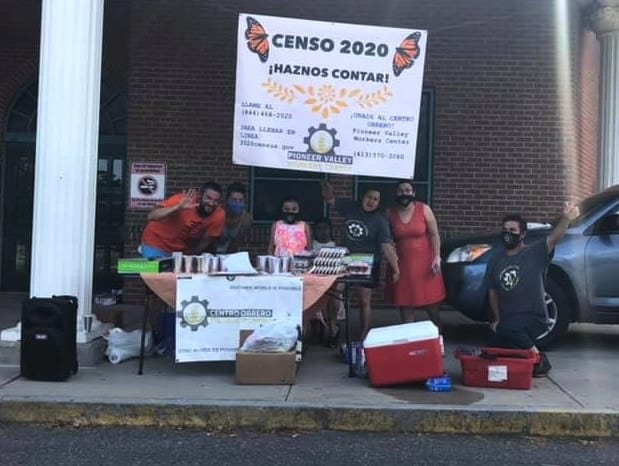January 28, 2021 Community Stories
Response Fund Aids Essential—but Often Excluded—Immigrant Workers
They stock your shelves, wash your plates in backroom kitchens, and weed fruit and vegetable fields under the blazing summer sun. They are the farm, restaurant, factory, and food chain workers laboring from Springfield to Greenfield to Turners Falls. Many are immigrants who fled violence in Central America and came to Western Massachusetts in search of jobs and safety.
They endure low wages, few benefits, discrimination, and little opportunity for advancement, according to Andrea Schmid, co-director and lead organizer of the Northampton-based Pioneer Valley Workers Center. Hundreds of immigrant workers in the Valley belong to the Workers Center, where they organize to improve conditions for themselves and other low-wage earners.
In surveys conducted by the Workers Center and UMass, local farm workers reported verbal abuse, lack of access to bathrooms and personal protective equipment (PPE), and no overtime pay. Some said that “if anyone speaks out, there’s serious retaliation among managers and workers,” Schmid conveyed.
COVID-19 worsened their plights. When the pandemic started, many were laid off. “These immigrants do the ‘invisible labor’ that helps make society function,” said Schmid, “but they are ineligible for any COVID relief benefits.”
In Massachusetts, undocumented people cannot get drivers’ licenses, unlike surrounding states. Schmid believes lack of driver’s licenses forced some workers to crowd together in cars to get to work, which increased their COVID risk. COVID outbreaks on Western Massachusetts farms have pushed many workers to leave jobs or quarantine, she reported.
With grant support from the Community Foundation’s COVID-19 Response Fund, other funders and individual donors, the Workers Center focused on “mutual aid” during the pandemic. They:
- Distributed farm-fresh local food, over-the-counter medications, household staples, prepared meals from Haymarket Café, and PPE to hundreds of undocumented immigrants. Volunteers—including many laid off from farm jobs—coordinated four distribution sites and arrange for pick-up or delivery.
- Provided cash to unemployed immigrant workers to cover rent and utilities.
- Purchased organic food for distribution from the new immigrant-led cooperative farm, Riquezas del Campo.
COVID-19 plunged many immigrant families over a financial cliff already eroded by systemic injustices over many years. According to Schmid, immigrant farm workers—who are predominately Black and Brown—have been excluded from worker protections and labor reforms in the U.S. Today, the federal minimum wage for farmworkers is a dismal $7.25 per hour ($8/hour in Massachusetts).
The Workers Center is forging ahead, using online means to organize immigrant workers to advocate for laws providing access to driver’s licenses and improved working conditions, especially on farms. But giving workers access to what they need to survive—“to stay afloat in the face of everything,” Schmid said—is their top priority.
Essential but often excluded, these workers need our community’s help now.
